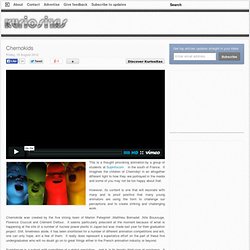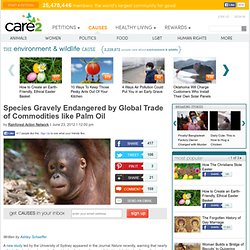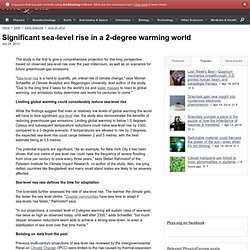

Chernokids. This is a thought provoking animation by a group of students at Supinfocom in the south of France.

It imagines the children of Chernobyl in an altogether different light to how they are portrayed in the media and some of you may not be too happy about that. However, its content is one that will resonate with many and is proof positive that many young animators are using the form to challenge our perceptions and to create striking and challenging work. Chernokids was created by the five strong team of Marion Petegnief ,Matthieu Bernadat ,Nils Boussuge, Florence Ciuccoli and Clément Deltour. This US summer is 'what global warming looks like': scientists. (AP) — Is it just freakish weather or something more? Climate scientists suggest that if you want a glimpse of some of the worst of global warming, take a look at U.S. weather in recent weeks.
Horrendous wildfires. Oppressive heat waves. Devastating droughts. Flooding from giant deluges. These are the kinds of extremes climate scientists have predicted will come with climate change, although it's far too early to say that is the cause. Scientifically linking individual weather events to climate change takes intensive study, complicated mathematics, computer models and lots of time. And this weather has been local. But since at least 1988, climate scientists have warned that climate change would bring, in general, increased heat waves, more droughts, more sudden downpours, more widespread wildfires and worsening storms.
Oppenheimer said that on Thursday. Welcome to the Bee Hotel. This remarkable structure can be found in Place des Jardins in Paris and is known as a bee hotel.

You may be wondering what bees need a hotel for, when they make their own hives. The truth is that many species of bees are solitary – the do not live in hives but instead construct their own nest. The main reason for this is because in these species every female is fertile and this would not make for comfortable communal living in a hive. Bee hotels are necessary for a number of different reasons. To begin with bee populations have been on a decline in recent years. It is often difficult to encourage solitary bees in urban areas because there are so few suitable nesting places for them. A distinct advantage for the humans who build and ‘rent’ out these hotels is that the more insects they attract the greater likelihood that insect pollination of fruit and vegetables will take place on their patch.
The above, for example, was specifically made for Red Mason bees. Earth Wavers On The Edge Of Dangerous Tipping Point. Human behavior is accelerating climate change, and setting in motion a chain of events that may put the future of our species in jeopardy.

Those who acknowledge the negative impact of human development accept this and desperately want to do something about it. We find it hard to swallow when others refuse to acknowledge or even consider the scientific facts that prove humans are altering the Earth’s climate in dangerous ways. The sad truth is that denying climate change won’t prevent it from happening. In fact, a new study published in Thursday’s edition of the journal Nature shows that the planet is approaching a dangerous climate tipping point, and our destructive habits are pushing it toward the edge. The researchers say a combination of variables are forcing the planet toward irreversible biological changes, including exploding global population, rapidly rising temperatures and the clearance of more than 40 percent of Earth’s surface for urban development or agriculture. Species Critically Endangered by Global Trade of Palm Oil. Written by Ashley Schaeffer A new study led by the University of Sydney appeared in the Journal Nature recently, warning that nearly a third of animal species under threat in developing nations are linked to global trade of manufactured goods and commodities such as palm oil.

As the researchers put it: “Human activities are causing the globe’s sixth major extinction event.” As reported in Reuters, this is the first time that the important role of international trade and foreign consumption as a driver of threats to species has been comprehensively quantified. In what has already been a devastating year for Sumatran tigers, orangutans and elephants, this study doesn’t bode well for these three species already on the IUCN’s list of critically endangered species, largely due to the encroachment of palm oil and pulp & paper plantations into their habitat: Take, for example, the dire situation with Sumatran elephants.
This post was originally published by Rainforest Action Network. Significant sea-level rise in a 2-degree warming world. The study is the first to give a comprehensive projection for this long perspective, based on observed sea-level rise over the past millennium, as well as on scenarios for future greenhouse-gas emissions.

"Sea-level rise is a hard to quantify, yet critical risk of climate change," says Michiel Schaeffer of Climate Analytics and Wageningen University, lead author of the study. "Due to the long time it takes for the world's ice and water masses to react to global warming, our emissions today determine sea levels for centuries to come. " Limiting global warming could considerably reduce sea-level rise While the findings suggest that even at relatively low levels of global warming the world will have to face significant sea-level rise, the study also demonstrates the benefits of reducing greenhouse-gas emissions. Limiting global warming to below 1.5 degrees Celsius and subsequent temperature reductions could halve sea-level rise by 2300, compared to a 2-degree scenario.